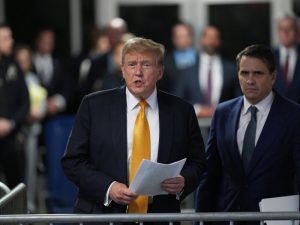The conviction of former President Donald Trump on 34 felony counts marks a historic moment in American legal and political history. The verdict, handed down by a Manhattan jury after more than nine hours of deliberation, centers on Trump’s involvement in a hush money payment to porn actor Stormy Daniels during his 2016 presidential campaign. As the presumptive Republican presidential nominee, Trump’s legal battles and their implications are now front and center in the national conversation.
The Charges and Conviction

Trump was found guilty of falsifying business records to hide a $130,000 payment made to Daniels through his then-lawyer, Michael Cohen. The payment aimed to silence Daniels about her alleged sexual encounter with Trump in 2006. The 34 counts of falsifying business records, a Class E felony in New York, each carry a potential prison sentence of up to four years. However, whether Trump will serve time behind bars remains uncertain. Sentencing is scheduled for July 11, just days before the Republican National Convention.
Potential Prison Time and Sentencing
Judge Juan M. Merchan will determine Trump’s sentence. While the maximum penalty could include prison time, other options, such as fines or probation, are possible. The political and logistical complexities of imprisoning a former president and active presidential candidate might influence the judge’s decision.
Manhattan District Attorney Alvin Bragg has not indicated whether his office will seek prison time for Trump. The sentencing could also be delayed pending the outcome of Trump’s appeals, which his legal team is expected to pursue vigorously.
Appeals and Legal Strategies
Trump’s defense team has already laid the groundwork for an appeal. They have raised concerns about Judge Merchan’s impartiality, citing his daughter’s professional connections to Democratic figures. Additionally, they objected to the judge’s restrictions on the testimony of Bradley Smith, a former Federal Election Commission member, who was set to rebut the prosecution’s claims that the hush money payment violated campaign finance laws.
The defense also argued against the admission of graphic testimony from Daniels, suggesting it was prejudicial and irrelevant. Trump’s lawyers are likely to use these and other objections as the basis for their appeal, aiming to overturn the conviction in higher courts.
Impact on the 2024 Presidential Election
Trump’s conviction does not disqualify him from running for or becoming president. Despite the legal challenges, he remains a potent force in the Republican Party and a frontrunner in the race for the GOP nomination. His supporters have largely remained loyal, and some strategists believe the conviction might even galvanize his base.
A recent ABC News/Ipsos poll indicated that only 4% of Trump’s supporters would withdraw their backing if he were convicted, though another 16% said they would reconsider their support.
In the immediate aftermath of the verdict, Trump’s campaign saw a surge in fundraising, and GOP officials across the political spectrum rallied to his defense. Trump’s ability to maintain his campaign and perform virtual rallies, even if under house arrest, underscores his resilience and the unwavering support from a significant portion of the Republican electorate.
Broader Implications and Political Fallout
Trump’s conviction is more than a personal setback; it represents a significant moment in the ongoing struggle between different visions of American democracy. The trial and its outcome highlight the deep political divisions in the country. Trump has consistently portrayed the legal proceedings as a politically motivated witch hunt, a narrative that resonates with his supporters and reinforces their belief in his victimization by the establishment.
For many Americans, the conviction reaffirms the principle that no one, not even a former president, is above the law. It underscores the importance of accountability and the rule of law in maintaining public trust in democratic institutions.
The Path Ahead
As Trump navigates the legal aftermath of his conviction, he also faces three other criminal cases. These additional legal battles could further complicate his political ambitions and impact the 2024 presidential race. However, the timelines for these cases remain uncertain, and they may not reach trial before the November election.
Trump’s legal team will likely continue to challenge the conviction and the charges in the other cases while his campaign leverages the legal battles to energize his base. The outcome of these efforts will play a crucial role in shaping the political landscape in the coming months.
Donald Trump’s conviction on 34 felony counts marks an unprecedented moment in American history, blending legal drama with political theater. As he faces the possibility of prison time, a lengthy appellate process, and ongoing criminal investigations, Trump’s resilience and his supporters’ loyalty will be tested. The coming months will reveal whether these legal challenges diminish his political influence or further solidify his position as a central figure in American politics.
In this deeply polarized era, Trump’s conviction reminds us of the complexities and challenges of upholding justice and democratic principles. It underscores the importance of vigilance in safeguarding the integrity of the electoral process and ensuring accountability for all, regardless of their status or power. As the nation watches these events unfold, the implications for the future of American democracy remain profound and far-reaching.




